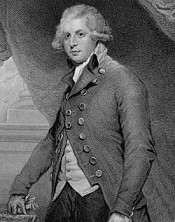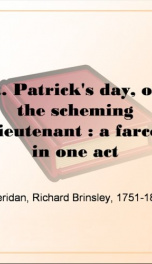Sheridan Richard Brinsley

Richard Brinsley Sheridan (30 October 1751 – 7 July 1816) was a playwright and poet and long-term owner of the London Theatre Royal, Drury Lane. For thirty-two years, he was also a Member of Parliament aligned with the British Whig Party. Such was the esteem he was held in by his contemporaries when he died that he was buried at Westminister Abbey. R.B. Sheridan was born in 1751 in Dublin, Ireland, where his family had a house on then-fashionable Dorset Street. He was a pupil at Harrow Boarding School outside London from 1762 to 1768. His mother, Frances Sheridan, was a playwright and novelist. She had several plays produced in London in the 1760s, though she is best known for her novel The Memoirs of Sidney Biddulph (1761). His father, Thomas Sheridan, was for a while an actor-manager at the Theatre Royal, Dublin but, following his move to England, he gave up acting and wrote a number of books concerning education and, especially, the standardisation of the English language in education. In 1771 the family settled in Bath.[1] In 1772 Richard Sheridan fought a famous duel against Captain Thomas Mathews. Mathews had written a newspaper article defaming the character of Elizabeth Linley, the woman Sheridan intended to marry, and honour dictated that a duel must be fought. A first duel was fought in London where they agreed to fight in Hyde park, but finding it too crowded they went to the Castle Tavern in Henrietta Street, Covent Garden. Far from its romantic image, the duel was short and bloodless. Mathews lost his sword and, according to Sheridan, was forced to 'beg for his life' and sign a retraction of the article. The apology was made public and Mathews, infuriated by the publicity the duel had received, refused to accept his defeat as final and challenged Sheridan to another duel. Sheridan was not obliged to accept this challenge, but would have become a social pariah if he had not. The second duel, fought in August 1772 at Kingsdown near Bath, was a much more ferocious affair. This time both men broke their swords but carried on fighting in a 'desperate struggle for life and honour'. Both were wounded, Sheridan dangerously, being 'borne from the field with a portion of his antagonist's weapon sticking through an ear, his breast-bone touched, his whole body covered with wounds and blood, and his face nearly beaten to jelly with the hilt of Mathews' sword'. Fortunately his remarkable constitution pulled him through, and eight days after this bloody affair the Bath Chronicle was able to announce that he was out of danger. Mathews escaped in a post chaise. In 1773, Richard Sheridan at age 21 married Elizabeth Linley and set up house in London on a lavish scale with little money and no immediate prospects of any—other than his wife's dowry. The young couple entered the fashionable world and apparently held up their end in entertaining. Less than two years later, his first play, The Rivals, was produced at London's Covent Garden Theatre. It was a success and established him in the favour of fashionable London. Shortly after the success of The Rivals, Sheridan and his father-in-law Thomas Linley, a successful composer, produced the opera, The Duenna. This piece was accorded such a warm reception that it played for seventy-five performances. In 1776, Sheridan, his father-in-law, and one other partner, bought a half interest in the Drury Lane theatre and, two years later, bought out the other half. Sheridan was the manager of the theatre for many years, and later became sole owner with no managerial role. On May 8, 1777, Sheridan directed his masterpiece, A School for Scandal, in the Drury Lane theatre of which he was now manager, with Mrs. Abington in the rôle of Lady Teazle. It was an immediate and lasting success.[1] He wrote the last of his three great comedies, The Critic, in 1779. In 1780, Sheridan entered Parliament as the ally of Charles James Fox on the side of the American Colonials in the political debate of that year. He is said to have paid the burgesses of Stafford five guineas apiece for the honour of representing them. As a consequence, his first speech in Parliament had to be a defence against the charge of bribery. When he failed to be re-elected to Parliament 32 years later, in 1812, his creditors closed in on him and his last years were harassed by debt and disappointment. On hearing of his debts, the American Congress offered Sheridan £20,000 in recognition of his efforts to prevent the Revolutionary War. The offer was refused. When Sheridan settled in London, he began writing for the stage. His first play, The Rivals, produced at Covent Garden in 1775, was a failure on its first night. Sheridan cast a more capable actor for the role of the comic Irishman for its second performance, and it was a smash which immediately established the young playwright's reputation. It has gone on to become a standard of English literature. His most famous play The School for Scandal (Drury Lane, 8 May 1777) is considered one of the greatest comedies of manners in English. It was followed by The Critic (1779), an updating of the satirical Restoration play The Rehearsal, which received a memorable revival (performed with Oedipus in a single evening) starring Laurence Olivier as Mr Puff, opening at the New Theatre on 18 October 1945 as part of an Old Vic Theatre Company season. Having quickly made his name and fortune, in 1776 Sheridan bought David Garrick's share in the Drury Lane patent, and in 1778 the remaining share. His later plays were all produced there [2]. But on 24 February 1809 (despite the much vaunted fire safety precautions of 1794) the theatre burned down. On being encountered drinking a glass of wine in the street while watching the fire, Sheridan was famously reported to have said: "A man may surely be allowed to take a glass of wine by his own fireside."[3] Sheridan was also a Whig politician, entering parliament in 1780 as the member for Stafford, under the sponsorship of Georgiana, Duchess of Devonshire. A great public speaker, he remained in parliament until 1812, and was a leading figure in the party. He held the posts of Receiver-General of the Duchy of Cornwall (1804–1807) and Treasurer of the Navy (1806–1807). In December 1815 he became ill, largely confined to bed. Sheridan died in poverty, and was buried in the Poets' Corner of Westminster Abbey; his funeral was attended by dukes, earls, lords, viscounts, the Lord Mayor of London, and other notables. He also wrote a selection of poems, and political speeches for his time in parliament. In The Duchess (2008) film, a biography of Georgiana Cavendish, Duchess of Devonshire, The School for Scandal is performed.
do you like this author?
What readers are saying
What do you think? Write your own comment on this book!
write a commentWhat readers are saying
What do you think? Write your own comment on this author!
write a commentBook list

the works of richard brinsley sheridan dramas poems translations speeches
Series:
Unknown
Year:
Unknown
Raiting:
4/5
Show more
add to favoritesadd In favorites

the speeches of the right honourable richard brinsley sheridan with a sketch of
Series:
Unknown
Year:
Unknown
Raiting:
4/5
Show more
add to favoritesadd In favorites
Book list

the works of richard brinsley sheridan dramas poems translations speeches
Series:
Unknown
Year:
Unknown
Raiting:
4/5
Show more
add to favoritesadd In favorites

the speeches of the right honourable richard brinsley sheridan with a sketch of
Series:
Unknown
Year:
Unknown
Raiting:
4/5
Show more
add to favoritesadd In favorites

the school for scandal a comedy in five acts with the stage directions and
Series:
Unknown
Year:
Unknown
Raiting:
5/5
Show more
add to favoritesadd In favorites

the dramatic works of richard brinsley sheridan
Series:
Unknown
Year:
Unknown
Raiting:
4/5
Show more
add to favoritesadd In favorites

the critic or a tragedy rehearsed a dramatic piece in two acts
Series:
Unknown
Year:
Unknown
Raiting:
5/5
Show more
add to favoritesadd In favorites

sheridans plays now printed as he wrote them and his mothers unpublished comed
Series:
Unknown
Year:
Unknown
Raiting:
5/5
Show more
add to favoritesadd In favorites

sheridans comedies the rivals and the school for scandal
Series:
Unknown
Year:
Unknown
Raiting:
5/5
Purchase of this book includes free trial access to www.million-books.com where you can read more than a million books for free. This is an OCR edition with typos. Excerpt from book: A PORTRAIT: ADDRESSED TO MRS. CREWE, WITH THE COMEDY OF THE SCHOOL FOR SCANDAL. BY R. B. SHERIDAN, Tell me, ye prim adepts in Scandal's school, Who rail by precept and detract by rule, Lives there no character, so tried, so known, So deck'd with grace, and so unlike your own, That even you assist her fame to raise, Approve by envy, and by silence praise ! Attend! a model shall attract your view Daughters of calumny, I summon you! You shall decide if this a portrait prove, Or fond creation of the Muse and Love. Attend, ye virgin critics, shrewd and sage, Ye matron censors of this childish age, Whose peering eye and wrinkled front declare A fix'd antipathy to young and fair; By cunning, cautious ; or by nature, cold, In maiden madness, virulently bold ! Attend, ye skill'd to coin the precious tale. Creating proof, where innuendoes fail! Whose practised memories, cruelly exact, Omit no circumstance, except the fact! Attend, all ye who boast, or old or young, The living libel of a slanderous tongue! So shall my theme as far contrasted be, As saints by fiends, or hymns by calumny. Come, gentle Amoret (for 'neath that name In worthier verse is sung thy beauty's fame); Come for but thee who seeks the muse ? and while Celestial blushes check thy conscious smile, With timid grace, and hesitating eye, The perfect model, which I boast, supply : Vain Muse! could'st thou the humblest sketch create Of her, or slightest charm could'st imitate Could thy blest strain in kindred colors trace The faintest wonder of her form and face Poets would study the immortal line, And Reynolds own his art subdued by thine, That art, which well might added lustre give To Nature's best, and Heaven's superlative: On Granbys c...
Show more
add to favoritesadd In favorites

St. Patrick's day, or, the scheming lieutenant : a farce in one act
Series:
Unknown
Year:
Unknown
Raiting:
1.5/5
This book was converted from its physical edition to the digital format by a community of volunteers. You may find it for free on the web. Purchase of the Kindle edition includes wireless delivery.
Show more
add to favoritesadd In favorites

Scarborough and the Critic
Series:
Unknown
Year:
Unknown
Raiting:
3.5/5
This book was converted from its physical edition to the digital format by a community of volunteers. You may find it for free on the web. Purchase of the Kindle edition includes wireless delivery. --This text refers to the Kindle Edition edition.
Show more
add to favoritesadd In favorites
What readers are saying
What do you think? Write your own comment on this author!
write a commentGenre
- Books
- Books / Children's Books / History & Historical Fiction
- Religion & Spirituality / Christianity / Literature & Fiction / Fiction
- Literature & Fiction / Genre Fiction / Historical
- Books / Shakespeare, William,1564-1616 / Criticism, Textual
- Nonfiction / Education / Education Theory / History
- Literature & Fiction / Drama / British & Irish
- Law / Study and teaching / Great Britain
- Books / Comedies
if you like Sheridan Richard Brinsley try:
readers also enjoyed
What readers are saying
What do you think? Write your own comment on this author!
write a commentGenre
- Books
- Books / Children's Books / History & Historical Fiction
- Religion & Spirituality / Christianity / Literature & Fiction / Fiction
- Literature & Fiction / Genre Fiction / Historical
- Books / Shakespeare, William,1564-1616 / Criticism, Textual
- Nonfiction / Education / Education Theory / History
- Literature & Fiction / Drama / British & Irish
- Law / Study and teaching / Great Britain
- Books / Comedies
if you like Sheridan Richard Brinsley try:
readers also enjoyed
Do you want to exchange books? It’s EASY!
Get registered and find other users who want to give their favourite books to good hands!

